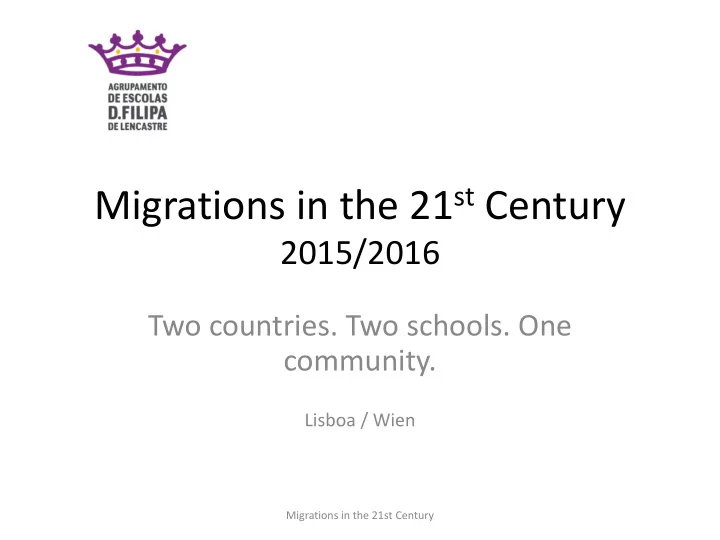

Migrations in the 21 st Century 2015/2016 Two countries. Two schools. One community. Lisboa / Wien Migrations in the 21st Century
The Project • Questions • Participants • Guidelines • Aims and objectives • Project methodology • Documents and other tools • Key words • Project evaluation Migrations in the 21st Century
Questions • How can 21 st century migrants be integrated in our societies ? • What is the difference between a refugee and a migrant ? • What can we do to help refugees ? Migrations in the 21st Century
Guidelines • Multiculturalism • Innovation • European citizenship • The philosophical concept of existing • Different forms of discrimination • EU hosting policies • POV of the host country • Voluntary work as strategic learning for life • The sea as a potential bridge or blockage between people Migrations in the 21st Century
Aims and objectives • Developing social, multidisciplinary and specific competences; • Building attitudes of respect; • Knowledge/ different cultural and work experiences; • Developing organisational skills – study and cultural skills • Developing technological and intercultural skills • Developing thinking skills ( task based methodology) • Understanding the world around us; • Developing literary skills Migrations in the 21st Century
Methodology • Working on a project basis; • Crossing different curricular topics – multiculturalism, the world of work, consumerism, extensive reading, etc; • Participating in a school trip to Vienna; Migrations in the 21st Century
Documents and other tools • Open letter to be sent to the ministry of Education of Portugal and Austria. • Discussion about the world of work – career choices, unemployment, new job opportunities; • Roleplay of job interviews • Writing a CV and covering letter; • Debates Migrations in the 21st Century
Documents and other tools • Presentation of a green product created by students. • BNW, Carly – extensive reading activities. • Narratives about the students’ reading experiences; • Conference; • Analysing different sources: – Documentaries; – Work of institutions involved in the AID process. Migrations in the 21st Century
Documents and other tools • Report; • Review; • Research work on UN, UNHCR and PAR (Plataforma Portuguesa de Apoio aos Refugiados). • Dramatization of a children story (“Carly”, by Annegert Fuchshuber); • Study trip to Vienna – presenting results. Migrations in the 21st Century
Filipa Solidário O Filipa Solidário é o órgão responsável pelo voluntariado feito pelos alunos e professores durante o ano letivo. Desde que se formou o Filipa Solidário, a escola tem vindo a apoiar inúmeras causas, nomeadamente, e mais recentemente, os refugiados, o CPR. Neste projeto toda a escola foi sensibilizada sobre o assunto e a mesma se disponibilizou para ajudar. Cada ano estava responsável por doar certos produtos, que no final seriam entregues ao Conselho Português para os Refugiados (CPR). Esta recolha de objetos de higiene foi feita durante o período de 29 de Fevereiro a 14 de Março.
Que produtos doar? • Pré-escolar: – Pasta de dentes • 1º Ciclo: – Gel de Banho • 2º Ciclo: – Leite de Corpo • 3º Ciclo: – Shampoo • Ensino Secundário: – Giletes descartáveis; – Escovas de Dentes; – Escovas de Cabelo.
O site – Filipa Solidário
Negative aspects • The study trip's high price, due to the organization of the school trip too near its date. • Low communication level between students of both schools. Migrations in the 21st Century
Positive aspects • Better understanding of the refugee’s issue. • Understanding the difference between a refugee and migrant. • Developing awareness on NGO’s work. • Opportunity to get to know other people and different cultures. • Improvement of English speaking skills. Migrations in the 21st Century
Added value of the project • The motivation for the importance of the concept of “active solidarity”; • The construction of learning networks at a multidisciplinary level. • The use of technologies to promote communication. Migrations in the 21st Century
Impact of the project A change of attitude must happen – a humanist approach to life should persist: • Broadening of students and teachers horizons in terms of learning process. • Increase of students and teachers command of English and new technologies. • Contribution to close relationship between the school communities of different countries. Migrations in the 21st Century
Key words • Community • Identity • Integrity • Freedom and Respect • Multiculturalism • Refugee • Migration Migrations in the 21st Century
Migrations in the 21st Century
Recommend
More recommend